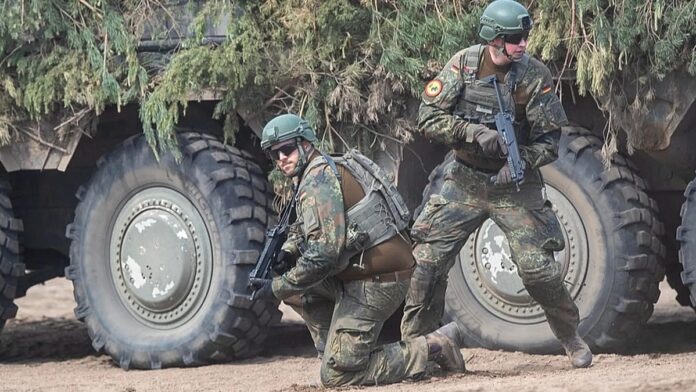Germany is implementing a massive defence plan to prepare for potential war with Russia, involving the movement of up to 800,000 NATO troops through its territory, according to a leaked 1,200-page Bundeswehr document.
The Operational Plan Germany (OPLAN DEU), drafted roughly two and a half years ago, is now being executed “at full speed” amid warnings from German officials that Russia could be ready to attack a NATO country as early as 2028, the Wall Street Journal reported.
The plan is intended to ensure that political decisions during a crisis or conflict can be made quickly, in line with the constitution, and in a coordinated manner that enables rapid action.
According to the Bundeswehr document, OPLAN DEU is designed to align Germany’s “cold-start capability, warfighting readiness, and resilience” with today’s security challenges.
The plan reportedly takes a “holistic approach,” closely integrating civilian and military functions. While its concept is reminiscent of Cold War-era strategies, it has been updated to reflect modern challenges such as ageing infrastructure, bureaucratic hurdles, and personnel shortages.
Putting the plan into action could be challenging due to outdated infrastructure like crumbling bridges, narrow tunnels and decaying ports, as well as bureaucratic obstacles, limited military capabilities and weak coordination with civilian agencies, according to reports.
‘Red Storm Bravo’
At the end of September, the Hamburg State Command ran the drill “Red Storm Bravo” to practice troop deployments. A spokesperson told Euronews the exercise would include the simulated arrival of NATO forces, moving together in a column eastward.
The training convoy, which was supposed to travel continuously without stopping, was delayed by long gaps between vehicles, a simulated drone, and a staged protest, covering less than ten kilometres in two hours.
The leaked operation plan notes that exercises like this highlight how even basic operations – crossing intersections, managing protests, or defending against drones – could stall in a real crisis.
Private companies are central to overcoming these challenges under OPLAN DEU. For instance, Rheinmetall provides temporary camps, supplies troops, and installs key infrastructure, such as showers, fuel stations, and field kitchens.
Getting the private sector involved
OPLAN DEU lists sabotage as one of the biggest threats, targeting critical infrastructure like railways and roads. These attacks are sometimes carried out by so-called “low-level agents,” as Euronews has previously reported.
The plan calls for drones to detect and counter sabotage. The unmanned aircraft are meant to protect critical infrastructure — including ports, roads and railways — and to spot potential threats early.
While they are considered essential for logistics and security in wartime, technical, legal, and organisational challenges remain.
Paul Strobel, spokesperson for the German drone company Quantum Systems, said that drones sold to the Bundeswehr are not allowed to fly over populated areas and must legally be equipped with position lights.
In the wake of Russian drone incidents in Poland, the EU proposed a so-called “drone wall” to protect NATO’s eastern flank. Strobel told Euronews how such a system could work in practice.
Last summer of peace?
German officials suggest that Russia could be ready to attack a NATO country from 2029, with acts of sabotage, espionage, and other incidents seen as potential warning signs.
German Defence Minister Boris Pistorius recently told the Frankfurter Allgemeine Zeitung newspaper that Russia is “rapidly building up arsenals despite the war in Ukraine.”
He also raised the possibility that an attack on the alliance could come sooner. “Military experts and intelligence services can roughly estimate when Russia will have rebuilt its armed forces enough to strike a NATO member in the east,” Pistorius said.
“We have always said this could be from 2029. Now, some suggest it could happen as early as 2028, and a few military historians even argue that last summer may have been the last one of peace.”
